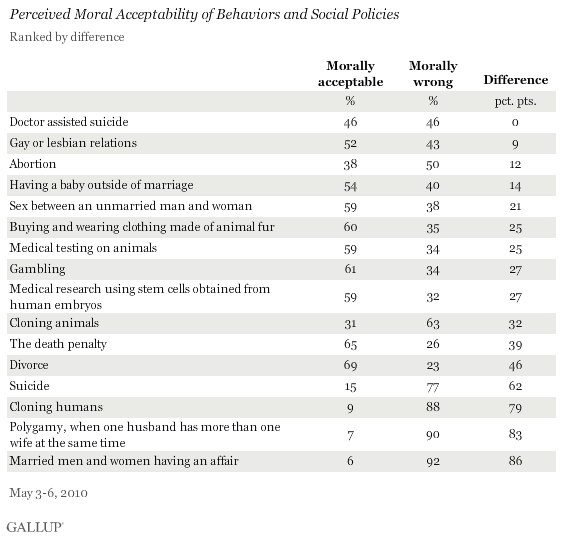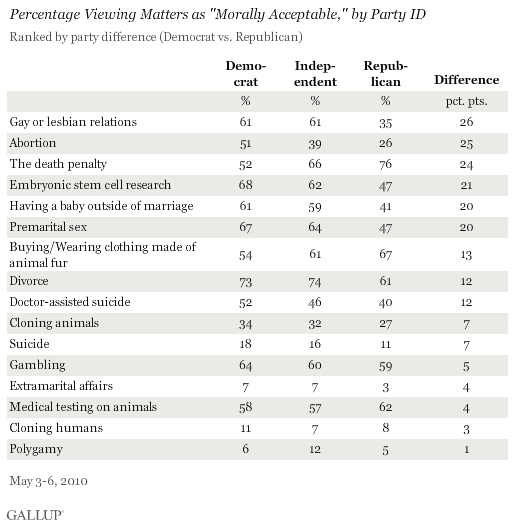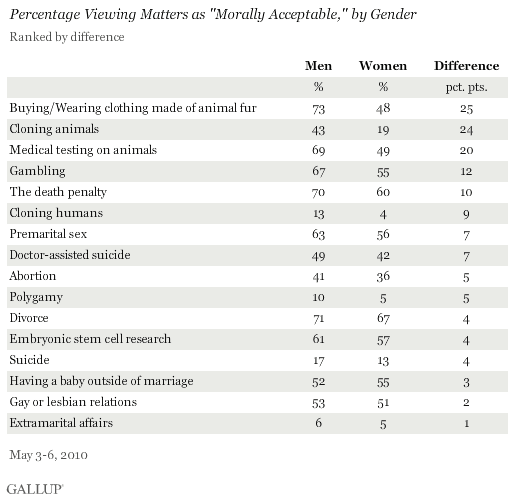PRINCETON, NJ -- Americans generally agree about the morality of 12 out of 16 behaviors or social policies that sometimes spark public controversy, with sizable majorities saying each is either "morally acceptable" or "morally wrong." By contrast, views on doctor-assisted suicide, gay and lesbian relations, abortion, and having a baby outside of marriage are closely divided -- the percentage supporting and the percentage opposing are within 15 points of each other.

The findings are from Gallup's annual Values and Beliefs survey, conducted May 3-6, 2010. While doctor-assisted suicide is the most controversial of the issues tested, with the public tied at 46% over its moral acceptability, Americans are fairly unified in their opposition to another life-ending choice -- suicide -- with 77% calling this morally wrong.
The morality of gay or lesbian relations is also relatively divisive in comparison with other issues Gallup tested; however, for the first time since this question was established in 2001, a slight majority, 52%, now finds them morally acceptable. Prior to a transition period from 2007 to 2009, when Americans were closely split on the issue, the majority had considered these relations morally wrong.
Political Divisions Greatest on Gay Relations and Abortion
Perhaps of some relevance to the 2010 midterm congressional elections, Gallup finds Republicans and Democrats the furthest apart in their reactions to several cultural matters related to sex and reproduction: gay/lesbian relations, abortion, embryonic stem cell research, having a baby outside of marriage, and premarital sex. Majorities of Democrats, compared with fewer than half of Republicans, consider each of these morally acceptable.
While there is also a wide gulf in attitudes toward the death penalty, majorities of Democrats as well as Republicans consider that policy acceptable.

Largest Gender Gaps Involve Animal Rights
The sharpest differences between men and women on these issues are not found on abortion or other reproductive matters, but on three issues that involve the ethical treatment of animals. Majorities of men, but less than half of women, consider the use of animal fur for clothing, and medical testing on animals to be morally acceptable. Also, there is a 24-point gap between men and women in their belief that cloning animals is acceptable.
Men are more accepting than women on nearly every item, but the differences on many are minimal, including on abortion, embryonic stem cell research, extramarital affairs, and having a baby out of wedlock.

Results are based on telephone interviews conducted May 3-6, 2010, with a random sample of 1,029 adults, aged 18 and older, living in the continental U.S., selected using a random-digit-dial sampling technique.
For results based on the total sample of national adults, one can say with 95% confidence that the margin of error is ±4 percentage points.
Interviews are conducted with respondents on landline telephones (for respondents with a landline telephone) and cellular phones (for respondents who are cell phone only). Each sample includes a minimum quota of 150 cell phone only respondents and 850 landline respondents, with additional minimum quotas among landline respondents for gender within region. Landline respondents are chosen at random within each household on the basis of which member had the most recent birthday.
Samples are weighted on the basis of gender, age, race, education, region and phone lines. Demographic weighting targets are based on the March 2009 Current Population Survey figures for the aged 18 and older non-institutionalized population living in continental U.S. telephone households. All reported margins of sampling error include the computed design effects for weighting and sample design.
In addition to sampling error, question wording and practical difficulties in conducting surveys can introduce error or bias into the findings of public opinion polls.
